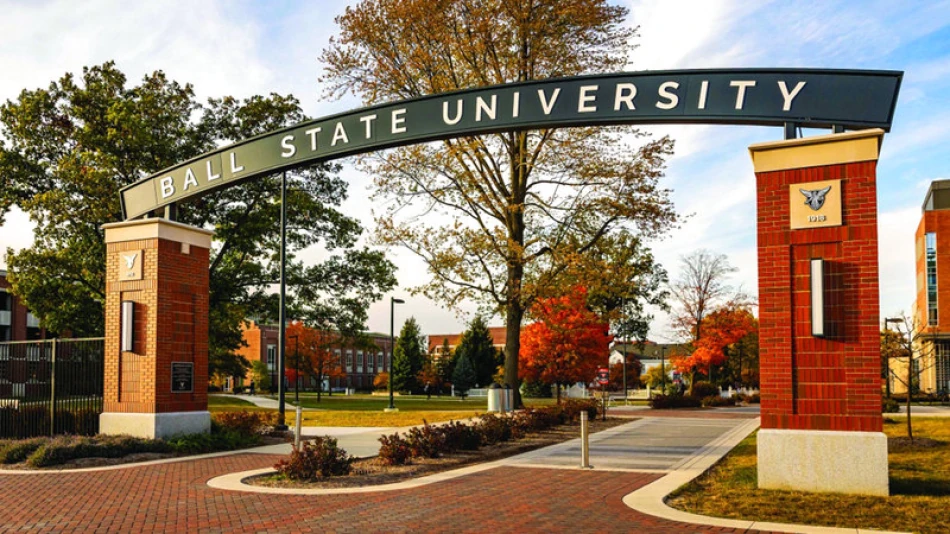
University Employee Terminated After Criticizing Charlie Kirk on Social Media
A Ball State University employee lost her job after posting on Facebook that she couldn't be friends with people who thought Charlie Kirk was "a great person." The post, made two days after the conservative influencer's assassination, sparked a massive online backlash and raises serious questions about free speech limits in American universities.
Susan Swyers woke up to find her phone flooded with missed calls and voicemails from unknown numbers. The messages were filled with threats and insults, including threats to get her fired from her job. "They cursed me with all kinds of words and threatened to get me fired," Swyers said. "The words were so harsh and brutal that you can't imagine. It was really very painful."
Her followers had taken screenshots of her Facebook post and shared it without her knowledge. The message spread across social media platforms, picked up by accounts known for targeting schools, hospitals, and public libraries. Libs of TikTok, a prominent conservative account, amplified her post on X (formerly Twitter).
The first threat arrived just 19 minutes after the post went viral. High-profile figures joined the pile-on, including billionaire Elon Musk, former New York mayor Rudy Giuliani, and Indiana Attorney General Todd Rokita, who called her comments "evil" and questioned her fitness for any leadership position. Someone later posted a voice message containing Swyers' home address, threatening she might face the same fate as Kirk.
After more than 6.9 million people viewed her post, Swyers called police. People had begun sharing details about where she lived, making her fear for her safety. "I felt like I was in the worst moments of my life," she said. "My mind couldn't process things, and I felt like I was going to throw up."
Five days later, Ball State University fired Swyers. She became part of a group of 32 employees terminated for similar posts criticizing Kirk. Indiana's Attorney General supported the university's decision, calling their legal analysis "100% correct" and suggesting other educational institutions should pay attention to what happened at Ball State.
Anonymous Reporting Systems Fuel Campus Tensions
The controversy highlights a broader shift in how universities monitor faculty and staff. Indiana created a government portal called "Eyes on Education" that lets parents file complaints about "inappropriate materials" in schools. This concept expanded to include all public universities, with anonymous complaints against professors and staff becoming common after lawmakers passed legislation aimed at combating liberal bias in higher education.
Ball State operates its own portal, "Ethics Point," where students can report biased faculty behavior without revealing their identities. Swyers was the first employee targeted through this system, but 31 others followed within days.
The anonymous reporting system has created a climate of fear among Indiana university faculty. Philosophy professor Sarah Vital, who serves as secretary of the American Association of University Professors chapter defending university employees, said colleagues are genuinely scared for their jobs. When she circulated a petition opposing Swyers' termination, only 83 out of 3,000 academic employees signed it. Many refused to include their names, some used only first names, and others said they'd only object if colleagues in their departments agreed to do the same.
But support for the university's decision was strong on social media. A tweet backing Ball State's action received 25,000 likes, showing the sharp divide in public opinion.
University Defends Action as Anti-Violence Measure
Ball State President Charlie Mendziara defended the firings as necessary to combat hate speech and reduce incitement to political violence. He argued that most university circles viewed such posts as encouraging political violence, something that required firm action.
The case has become a flashpoint in debates over free speech in academic environments. Critics question whether universities and employers should monitor and punish employees' personal social media opinions. Supporters argue that public employees at state universities should be held to higher standards, especially when their comments could be seen as endorsing violence.
President Trump blamed "radical left" rhetoric for contributing to Kirk's assassination, calling the conservative influencer a "martyr for truth and freedom." Trump promised his administration would track down everyone who contributed to the crime and any other political violence, including organizations that fund and support them.
The incident has created lasting tensions on campus. About 100 students held a protest after Kirk's death, with some carrying small signs reading "I am Charlie." Republican and Democratic student clubs struggled to draft a joint statement, disagreeing over whether to include support for free speech alongside condemnation of political violence.
Even conservative academics have criticized the university's response. Economics professor Michael Hicks from Indiana University, known for his conservative views, said the moment should have been used to teach students about the First Amendment and the importance of respecting free speech rights, especially when facing anger and desires for revenge. "We chose to give in to those who only seek to see people fired from their jobs," Hicks said. "We lacked the courage to defend free speech, even with those we strongly disagree with."
Most Viewed News

 Sara Khaled
Sara Khaled






